ASU officials published their annual statistics on crime at the school, a report covering all crime on the campus, at the end of September.
The document contains information about all five ASU campuses, including the Lake Havasu campus, and the students that live on them. Approximately 22 percent of currently enrolled students, about 9,000 students, live in the area covered by these numbers.
The largest campus, Tempe, was also the largest hotbed for crime, with nearly 2,200 individual incidents reported by the University.
Violent Crimes
Cases of aggravated assault on the Tempe campus shot up from 2014, with eight incidents reported, compared to zero in the previous year. The record for most assaults on campus in a year is still 2013, when a total of 13 incidents took place.
Incidents of rape on campus grounds doubled from 2014 to 2015, with students reporting 14 individual incidents to campus officials.
To report an incident of rape or sexual assault, call 911 or 480-965-3456 to speak with law enforcement officials.
Counseling services are also available for victims of sexual violence at the four main ASU campuses.
Dating violence, which the school categorizes as “violence committed by a person who is or has been in a social relationship of a romantic or intimate nature with the victim,” has also increased from 2014. A total of 11 incidents were reported in 2015, compared to two from the previous year.
Theft
The Tempe campus was also the only location where burglaries were reported significantly more than in previous years. Only 34 incidents of burglary were reported in 2014, compared with 57 reported in 2015.
Burglaries on the Downtown Phoenix campus have gone down significantly over the years shown in the data, with eight burglaries in 2013, two in 2014 and only one in 2015.
Motor vehicle theft at the Tempe campus also increased during 2015. Six incidents were reported the previous year, but the 2015 data shows 17 reports of vehicle theft.
Drugs and Alcohol
Tempe also had the largest number of drug related arrests on campus, with 325 reported in 2015. However, the increase, from 234 in 2014, correlates to a downturn of drug referrals between the years, with only 380 referrals in 2015, a drop of 178 across the campus from the previous year.
However, alcohol related incidents on the campus dropped by more than 25 percent between 2014 and 2015, with only 314 arrests made for alcohol related offenses in 2015 compared with 438 in 2014.
Other Noteworthy Stats
For the first time in three years, hate crimes also made their way to Tempe campus, with two “incidents characterized by racial bias” taking place at the campus, according to university findings. No other hate crime incidents have been reported across all five campuses in the years show in the data.
West campus maintained the low crime atmosphere from the previous years, with a single robbery being the only violent offense reported to campus police during the year.
The Polytechnic campus shows a similar trend, with low rates of violent crime. Only one arrest was made on that campus grounds for an incident regarding alcohol.
The Lake Havasu campus reported no crimes on campus grounds for the entirety of the year, reflecting the same lack of crime from previous years.
Response To The Data
Officials from ASU believe this increase in reports of violent crimes are indicative of a push by the school to empower students to speak out.
“As ASU has fought to prevent sexual violence and harassment, the university has worked to create an environment in which people feel empowered to seek help,” ASU officials said in a statement. “Researchers and advocates emphasize that, as colleges and universities do more to encourage reporting, the number of reports will rise as awareness and trust grow.”
Law enforcement officials do not believe the changing demographic of the crimes committed is a response to a policy change.
No major changes were made to policing policy or regulations with the ASU Police Department during the time specified in the report, said spokesperson Katy Harris.
This reporting was taken from ASU’s annual Clery Report, which is produced annually due to a requirement of the Clery Act, which was passed after Jeanne Clery, a college student, was raped and murdered in her dorm in 1986. It requires colleges and universities that get federal funding to share information about campus crime and their safety and security policies.
Reach the assistant news editor at megan.janetsky@asu.edu or follow @ckm_news on Twitter.
Like The State Press on Facebook and follow @statepress on Twitter.




